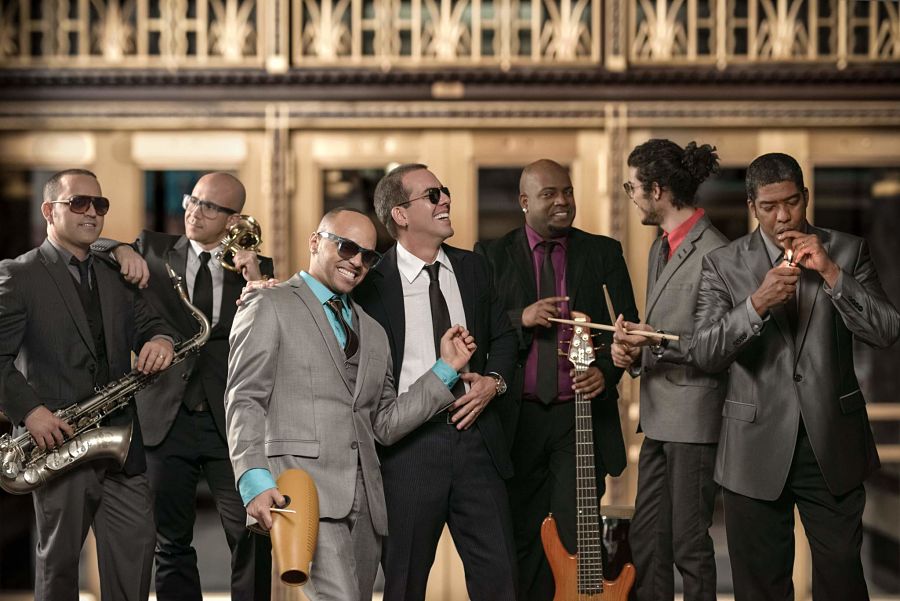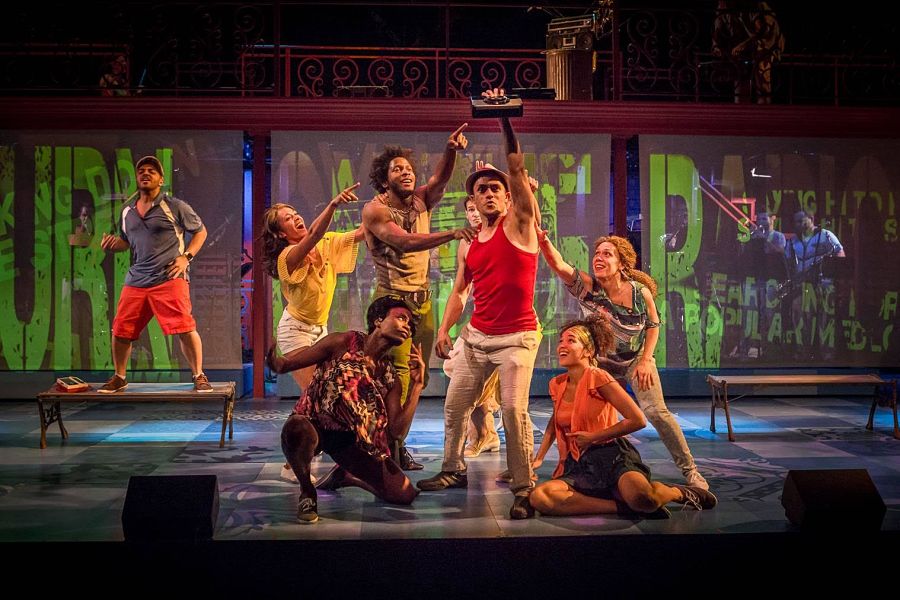Visiting Havana, you hear the irresistible strains of live Latin music everywhere—not only in nightclubs and concert halls, but in small cafés, on street corners, across plazas, in schools and senior centers. The country has been financially impoverished for decades; its stately old buildings are crumbling like long-decayed teeth. Yet Cuba’s musical educational system remains superb, its rich musical traditions are alive and dynamic, and the contemporary pop and jazz scenes sizzle.
The U.S. government’s economic embargo of the Communist country has long limited our stateside access to Cuban cigars and rum. But the variegated and multihued, spicy and sonorous music of Cuba has been relatively free floating, as music tends to be, especially in the digital age. American visitors are bringing home the latest rumba and timba, son and Cubaton discs, and Cuban music downloads are readily obtainable on the Web. And of course, several generations of musicians have made the 93-mile journey from Cuba to settle, perform, and record in the U.S.
Yet beyond Miami, the Norteamericano center of this expat community, there’s been little musical theatre here that unfolds to a Cuban beat. Perhaps serendipitously, as diplomatic relations between Cuba and the U.S. have warmed, and American tourism to and fascination with the island is exploding, some Cubanos are eyeing Broadway as a venue for shows that showcase their music but also their cross-cultural stories—personal sagas explored in the revelatory plays of Nilo Cruz, Eduardo Machado, and other Cuban-American dramatists, but not yet musicalized on Broadway.
In the 1990s, a musical version of the Oscar Hijuelos novel The Mambo Kings Play Songs of Love foundered on its way to Broadway after a disappointing try-out in San Francisco. But now two other Cuban-themed shows have emerged: Cuba Libre, presented by Portland’s Artists Repertory Theatre in a premiere run at Portland’s Winningstad Theatre through Nov. 15, and On Your Feet!, a jukebox tuner based on the lives and careers of multi-Grammy-winning pop music couple Gloria and Emilio Estefan, who came of age in Miami after their families fled the Communist revolution led by Fidel Castro.
At the Oriental Theatre in Chicago last year, and now on Broadway, On Your Feet! has won praise for the picante music (including favorites by the Estefans’ hit-heavy band, Miami Hit Machine) and exhilarating numbers choreographed by Broadway veteran Sergio Trujillo. Chicago Tribune critic Chris Jones wrote that writer Alexander Dinelaris (an Oscar winner for his Birdman screenplay) and Broadway veterans Trujillo and director Jerry Mitchell have “not only avoided feathery excess and nostalgic 1980s schmaltz, they’ve created a show with a strikingly high amount of emotional intimacy.”

Most New York critics valued the show’s zesty music over its near-tragedy-to-triumph book, which focuses on Gloria’s Miami youth and her rise to diva stardom and collaboration with her producer/musician husband Emilio. In short, On Your Feet! is a jukebox musical with a different but increasingly popular sound in a country with a growing Latino population, and it has all the makings (and the advance sales) of a commercial hit.
Those behind Cuba Libre, which I caught recently in Portland, are also hoping for a shot at Broadway. It has very different story to relate, as it focuses more on the experience of life in recent-times Cuba than on a classic immigrant success story.
The driving forces behind the production, which has been developed over several years in Los Angeles and Portland, are all natives of Cuba or of Cuban heritage: director Damaso Rodriguez (artistic director of Artists Rep), writer Carlos Lacámara, and composer/lyricist Jorge Gomez. In its current state, it is packed with 18 exhilarating musical numbers, performed by the high-octane Cuban band Tiempo Libre (whose engaging members also play small roles), a cadre of potent and ingratiating singer/actors, and thrilling dances by Cuban-American choreographer Maija Garcia (who was Bill T. Jones’ associate choreographer for Broadway’s Afro-beat wonder Fela!).
The brass-and-drum-fueled timba genre, Cuba Libre’s specialty, is a densely layered, ever-evolving merger of indigenous Cuban musical elements and styles (Afro-Cuban percussion, rumba, son), and American rock, jazz, and funk. And to anyone with a pulse, it is irresistibly appealing.

But in addition to the rousing and lyrical score (including an ecstatic finale that gets the audience up and dancing), what’s most intriguing about Cuba Libre is the world it struggles to convey. The show doesn’t harken back to the well-known mass migration of Cubans to the U.S. in the 1950s and early ‘60s. It considers the discontents of a more recent generation that experienced great hardship in the 1980s and ‘90s, the euphemistically titled “special period” after the crumbling Soviet Union withdrew its financial and material support from Cuba but the punishing U.S. economic embargo continued.
The weakness and the promise of Cuba Libre lie in playwright Lacámara’s book, inspired by composer/musician Gomez’s and his fellow band members’ seriocomic struggles in Havana before he and fellow band members emigrated to the U.S. in the mid-1990s. Refreshingly, the lead character, Alonso (played with swaggering charm by German Alexander), is no choirboy or purely heroic striver. He’s a successful but unreliable Cuban bandleader in the U.S. looking back on his struggles as a younger man who drifted in and out of trouble as he scratched out a life in culturally rich but financially impoverished Havana.
Alonso is not rabidly anti-Castro, but he is casually cynical about his mother’s devotion to a revolution that has, for much of his generation, failed to provide hope over hardship. One especially trenchantly amusing and telling episode illustrates the underground economy in full swing, as Alonso embarks on a round of bartering with numerous “vendors” in order to score a trumpet.
Homophobia and the AIDS epidemic in Cuba during this period are also referenced in a subplot about an ailing gay trumpet player, Hector (Brandon Contreras) and his lover. There’s also glancing reference to the tens of thousands of Cubans who risked drowning in attempting to flee to the U.S. on rafts and small boats.
Much of Alonso’s tale hinges on a retrospective view of his love for a dedicated doctor, Lisandra (Janet Dacal), who is initially aloof to his advances before the passion kicks in. This flashback romantic plot gets soggy, and in the U.S. scenes, Alonso’s current lover, band manager Annie (Sara Hennessy), is so sketchily drawn that it’s hard to care if they split up or continue their rocky affair.
Since the most interesting aspect of Cuba Libre is its portrait of Alonso’s defiant life in Cuba, why not trim the framing device and give us more of his journey, from getting inspired by hearing Michael Jackson on homemade short-wave radio to making a new life in Miami that turns out not be perfection after all?
Fair warning: Cuba Libre won’t please those who idealize Cuban socialism, nor those who simply revile it. It doesn’t take into account some recent reforms made by Raul Castro or consider the potential tradeoffs of a coming influx of American tourism and, in all likelihood, American trade and investment. That’s for another Cuban musical or play.
But anyone who has been to Cuba and strayed off the official state tour can tell you what a fascinating bundle of contradictions the society is—how warm and resilient its people, how battered its economy and infrastructure, how vibrant its la vida musical. If in its next drafts it can deliver a story half as compelling as its surging music, Cuba Libre might well add something both meaningful and simpatico to an increasingly globalized Broadway.


